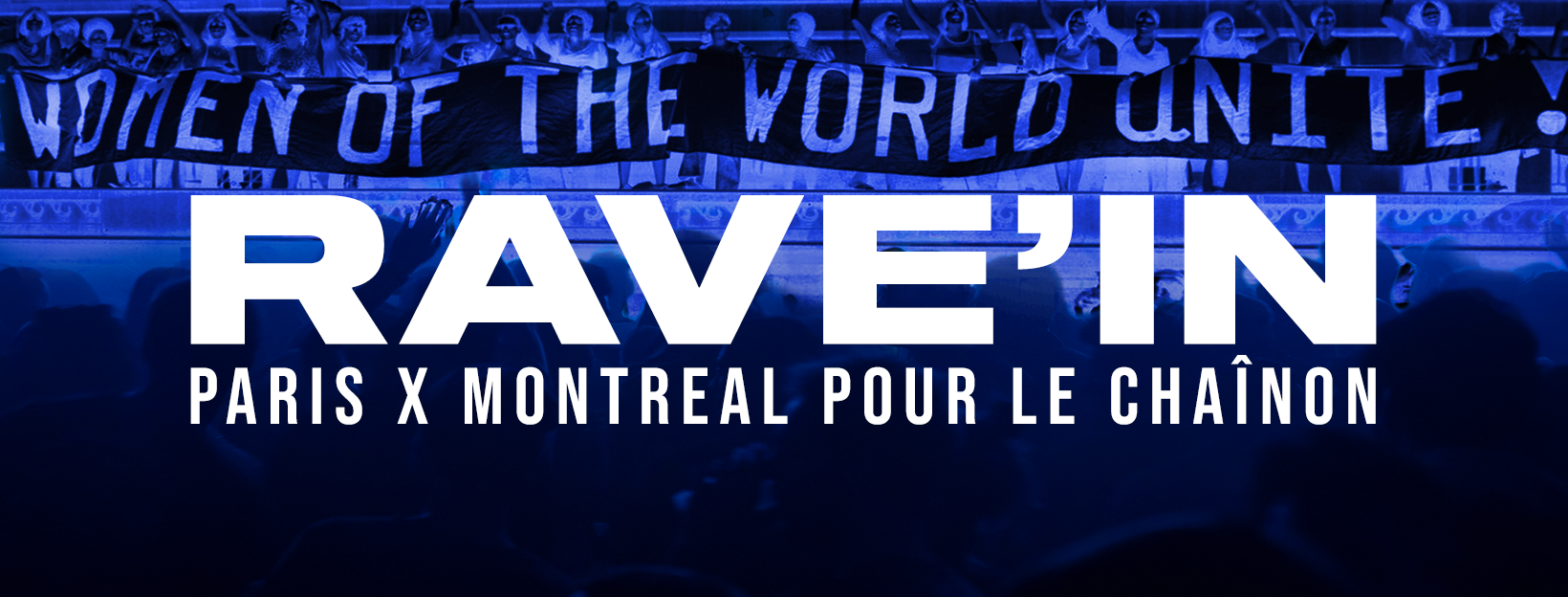This weekend’s virtual techno event is also a fundraiser for local non-profit, Le Chaînon.
This Saturday’s RAVE’IN event is about more than just music. With an all-women lineup, the event aims to draw awareness to femicide and raise donations for Le Chaînon, a Montreal-based non-profit organization that helps women in difficult situations, such as domestic violence, addiction and poverty.
Event organizer Léopoldine, was an exchange student from Paris at Concordia University during the 2019 winter semester. She had originally planned for the event to be a French culture night to share the musical culture of Île-de-France. She then partnered with OCTOV, a Montreal techno music collective that was established in 2014, in order to bring this event to fruition.
As an exchange student in Montreal, Léopoldine wanted the event to be a way to share her love of the Île-de-France region.
“At first I didn’t really go out of the city that much, but it’s my passion for music that pushed me to outside the city because there were more interesting and innovative and cheaper music venues in the outskirts of Paris,” said Léopoldine.
This event was originally intended to be held at Reggie’s, Concordia’s on-campus student-run bar, before the COVID-19 pandemic shut everything down.
“This is a feminist event for charity. Truth is that this wasn’t what I originally had planned for my event,” she added. “At first, it was supposed to be a French night for students, by students for the IDF (Île-de-France) French music, but coronavirus made me rethink my approach to this event, I realized I could still do it with a live stream.”
However, one impact of the pandemic had a profound influence on Léopoldine and changed the goal of the event.
“I was really touched when I heard about the rise of domestic violence with the lockdown. That’s when I thought of making it for charity so I looked up associations that were doing work in this field and that’s when I found Le Chaînon.”
Léopoldine eventually sought out further ways to involve women in her ideal event.
“My project was taking form, I knew it was going to be a live stream, for charity for women. So logically I wanted to get other women involved. To make it empowering and uplifting. That was the vibe I was going for,” said Léopoldine. “BitterCaress was the first DJ I reached out to for this event. She encouraged me in this direction.”
Camille Bernard, better known as BitterCaress, is a Montreal-based DJ who was born in Paris. She sees techno music as a gateway to change.
“By starting to mix, I wanted to be able to express my opinion on various current issues that affect us from near and far. I sincerely believe that through art and specifically music, we can aspire to build a better world, make our audience think about certain important social issues and thus, help raise awareness and change attitudes,” said Bernard.
Bernard’s SoundCloud podcast, Mixing For a Cause, features a variety of episodes addressing topics such as violence against women, homophobia and arguments for pro-choice.
As of April 2020, Bernard rejoined OCTOV as a resident DJ following two years of sporadic collaboration with them.
“The techno world has anti-oppression values at heart, advocates open-mindedness, respect for others and for difference … However, despite the growing number of DJs, the integration of women is not always easy in this predominantly male environment … It’s not easy being a woman in this environment.”
Bernard added that “There is still a delay to catch up to achieve parity. In our community, curiosity must be nurtured every day, it is important to follow the development of emerging female DJs. We are all the actors and leaders of change in our local scene.”
When it comes to encouraging female artists, Bernard is not shy.
“With [the RAVE’IN event], I hope that we can show women who want to get involved within the techno scene that it is possible to become an agent of change and do something on their own scale.”
Bernard also added that this event will serve as an example, “To continue uplifting women’s voices in music, we should help women to express themselves without being afraid of being ‘too loud’ and continue making women more visible.”
When asked about what the future holds for events she plans to organize, Léopoldine said, “We’re in talks for making more live streams in the same line as this one. We have people reaching out saying they like what we’re doing and we have other artists wanting to play. I think it has a lot of potential. OCTOV and I would obviously love to go back to having events in public but we’ll keep to livestreams for now.”
With the event coming up soon, Léopoldine is looking forward to hearing the music by the two DJs, BitterCarres, and FAAST, accompanied by two visual artists, Rozetta and QUINT.“You can be sure that Saturday I’ll be in my living room with my speakers as high as my neighbours will tolerate it. I’ll be enjoying myself.”
The event can be accessed here.
